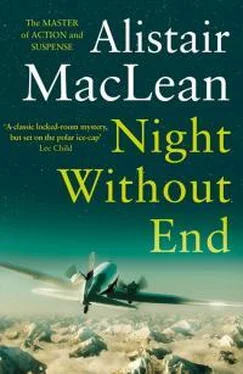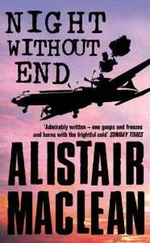Алистер Маклин - Night Without End
Здесь есть возможность читать онлайн «Алистер Маклин - Night Without End» — ознакомительный отрывок электронной книги совершенно бесплатно, а после прочтения отрывка купить полную версию. В некоторых случаях можно слушать аудио, скачать через торрент в формате fb2 и присутствует краткое содержание. Год выпуска: 101, Жанр: Боевик, Триллер, на английском языке. Описание произведения, (предисловие) а так же отзывы посетителей доступны на портале библиотеки ЛибКат.
- Название:Night Without End
- Автор:
- Жанр:
- Год:101
- ISBN:нет данных
- Рейтинг книги:4 / 5. Голосов: 1
-
Избранное:Добавить в избранное
- Отзывы:
-
Ваша оценка:
- 80
- 1
- 2
- 3
- 4
- 5
Night Without End: краткое содержание, описание и аннотация
Предлагаем к чтению аннотацию, описание, краткое содержание или предисловие (зависит от того, что написал сам автор книги «Night Without End»). Если вы не нашли необходимую информацию о книге — напишите в комментариях, мы постараемся отыскать её.
An airliner crashes in the polar ice-cap. In temperatures 40 degrees below zero, six men and four women survive. But for the members of a remote scientific research station who rescue them, there are some sinister questions to answer – the first one being, who shot the pilot before the crash?
Night Without End — читать онлайн ознакомительный отрывок
Ниже представлен текст книги, разбитый по страницам. Система сохранения места последней прочитанной страницы, позволяет с удобством читать онлайн бесплатно книгу «Night Without End», без необходимости каждый раз заново искать на чём Вы остановились. Поставьте закладку, и сможете в любой момент перейти на страницу, на которой закончили чтение.
Интервал:
Закладка:
It was a stupid, unnecessary, gratuitously truculent question to ask, but that’s just the way I felt at that moment. I suppose, really, that I was inviting protest so that I could have some victim for working off the accumulated rage inside me, the anger that could find its proper outlet only against those responsible for this fresh infliction of suffering, the anger at the near certainty that no matter what effort we made to save Mahler it would be completely nullified when the time came, as it inevitably must come, that the killers showed their hand. For one wild moment I considered the idea of tying them all up, lashing them inside the tractor body so that they couldn’t move, and had the conditions been right I believe I would have done just that. But the conditions couldn’t have been more hopeless: a bound person wouldn’t have lasted a couple of hours in that bitter cold.
There were no objections. For the most part, I suppose, they were too cold, too tired, too hungry and too thirsty – for with the rapid evaporation of moisture from the warm, relatively humid body thirst was always a problem in dry, intensely cold air – to raise any objections. To people unaccustomed to the Arctic, it must have seemed that they had reached the nadir of their sufferings, that things could get no worse than they were: I hoped as much time as possible would elapse before they found out how wrong they were.
There were no objections, but there were two suggestions. Both came from Nick Corazzini.
‘Look, Doc, about this diet Mr Mahler must have. Maybe we can’t balance it, but we can at least make sure that he gets a fair number of calories – not that I know how you count the damn’ things. Why don’t we double his rations – no, even that wouldn’t keep a decent sparrow alive. What say each of the rest of us docks a quarter of his rations and hands them over? That way Mr Mahler would have about four times his normal–’
‘No, no!’ Mahler protested. ‘Thank you, Mr Corazzini, but I cannot permit–’
‘An excellent idea,’ I interrupted. ‘I was thinking along the same lines myself.’
‘Good,’ Corazzini grinned. ‘Carried unanimously. I also suggest we’d get along farther and faster if, say, Mr Zagero and I were to spell you two on the tractor.’ He held up a hand as if to forestall protest. ‘Either of us may be the man you want, in fact, we might be the two men you want – if it is two men. But if I’m one of the killers, and I know nothing about the Arctic, navigation, the maintenance of this damned Citroën and wouldn’t as much as recognise a crevasse if I fell down one, it’s as plain as the nose on your face that I’m not going to make a break for it until I’m within shouting distance of the coast. Agreed?’
‘Agreed,’ I said. Even as I spoke, there came a coughing clattering roar as Jackstraw coaxed the still-warm Citroën back into life, and I looked up at Corazzini. ‘All right,’ I went on. ‘Come on down. You can have your first driving lesson now.’
We left at half-past seven that morning, in driving conditions that were just about perfect. Not the slightest breath of air stirred across the ice-cap and the deep blue-black vault of the sky was unmarred by even the tiniest wisp of cloud. The stars were strangely remote, pale and shimmering and unreal through the gossamer gauze of the glittering ice needles that filled the sky and sifted soundlessly down on the frozen snow, but even so visibility was all that could have been desired: the powerful headlights of the Citroën, striking a million sparkling diamond points of light off the ice spicules, reached a clear three hundred yards ahead into the darkness, leaving the ground to either side of the twin interlocking beams shrouded in impenetrable darkness. The cold was intense, and deepening by the hour: but the Citroën seemed to thrive on it that morning.
Luck was with us almost right away. Within fifteen minutes of starting off, Balto, ranging free as always, appeared out of the darkness to the south-west and ran alongside the dog-sledge, barking to attract Jackstraw’s attention. Jackstraw gave us the signal to stop – a rapid flickering of the red and green lights on the tractor dashboard – and in two or three minutes appeared out of the darkness, grinning, to tell us that Balto had picked up a standing trail flag. That was good news in itself, in that it meant that our navigation the previous night had been all that could have been wished for and that we were almost exactly on course: even more important, however, was the fact that if this flag was the first of a series we could dispense with the navigator on the dog-sledge and that Jackstraw and I could have some sleep – if sleep were possible in that miserably cold and lurching tractor body. And, indeed, that flag proved to be the first of an almost unbroken series that was to guide us all the length of that interminable day, so that from eight o’clock onwards Jackstraw, Zagero, Corazzini and I took it in turns to drive, with the Senator, the Reverend Smallwood or Solly Levin up front as lookout. Theirs was probably the coldest, certainly the most unwelcome job of all: but all three bore up uncomplainingly, even to the extent of thawing out in silent agony at the end of their hour on duty.
Shortly after eight o’clock I left an obviously competent Corazzini to his own devices, dropped back to the shelter of the tractor body and asked the Senator to go up front. I then set about breaking the strictest rule of all, where these old tractors were concerned – that no fire should ever be lit inside when they were in motion. But even the most stringent rules are to be observed only until such time as the need for breaking them is paramount: and now both the need and the time were here. My concern was not for the warmth and comfort of the passengers, or even for the cooking of the food – we had little enough of that, heaven knew, though a constant supply of warm water would come in useful for dealing with the inevitable cases of frostbite – but purely and simply for the life of Theodore Mahler.
Even following Corazzini’s suggestion we couldn’t give him enough food, and what we could didn’t, and wouldn’t, even begin to resemble a balanced diet. His best chance of survival, and that was slender enough, lay in conserving his body reserves and his energy as far as lay within our power. To achieve that, work, or exercise of even the lightest kind, was out: he had to remain as immobile as possible, which was why I had him climb into a sleeping-bag and lie down on one of the bunks, wrapped in a pair of heavy blankets, as soon as I entered. But without work or exercise he would have no means to combat that numbing cold except by a constant shivering which would deplete his reserves just as quickly as the most violent exercise would. So he had to have heat: heat from the stove, heat from the warm fluids which I told Margaret Ross that he was to have at least every two hours. Mahler protested strongly against all these arrangements being made on his behalf, but at the same time he was sensible enough to realise that his only chance of survival depended on doing what I said: but I believe that the main factor which finally made him yield was not so much my medical explanations as the pressure of public opinion.
That all the passengers should suddenly, and so vehemently, be concerned with Theodore Mahler’s welfare seemed, on the face of it, inexplicable. But only on the face of it. It did not require a great deal of thought or probing beneath the surface to discover that the true motivating factor was not selflessness – though there may have been some of that, too – but selfishness. Mahler represented not so much a sufferer as a most welcome diversion from their own thoughts and suspicions, from the tension, from the never-ending constraint that had laid its chilling hand over the entire company for the past twelve hours.
Читать дальшеИнтервал:
Закладка:
Похожие книги на «Night Without End»
Представляем Вашему вниманию похожие книги на «Night Without End» списком для выбора. Мы отобрали схожую по названию и смыслу литературу в надежде предоставить читателям больше вариантов отыскать новые, интересные, ещё непрочитанные произведения.
Обсуждение, отзывы о книге «Night Without End» и просто собственные мнения читателей. Оставьте ваши комментарии, напишите, что Вы думаете о произведении, его смысле или главных героях. Укажите что конкретно понравилось, а что нет, и почему Вы так считаете.










